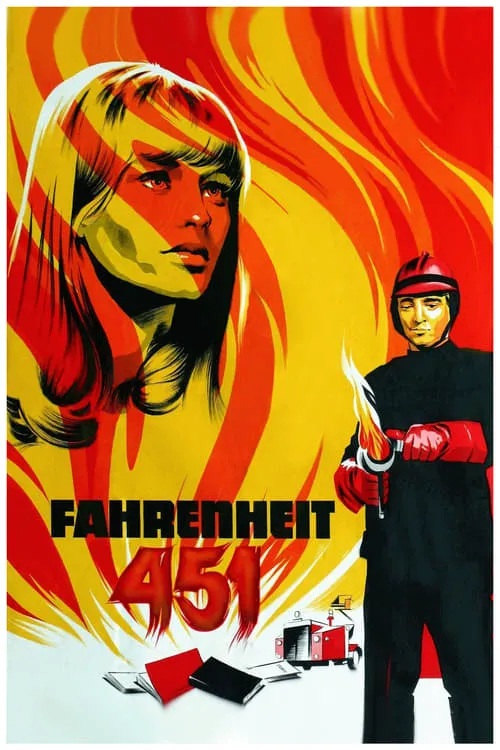Fahrenheit 451

Plot
In the dystopian future of Guy Montag's world, society has reached a state of complacency and conformity, where individuals are conditioned to suppress their own thoughts and desires in favor of a homogeneous existence. The ruling authorities have outlawed any form of literature that might spark intellectual curiosity or independent thinking, instead promoting a culture of instant gratification and superficial entertainment. The role of the firemen, once noble and honorable, has been redefined. They are now tasked with the seemingly counterintuitive duty of incinerating books and other materials that might contain knowledge or ideas considered threatening to the status quo. Fireman Montag, played by Oskar Werner in the 1966 film adaptation, has become an integral part of this oppressive regime, participating in the systematic destruction of cultural heritage. Montag's existence revolves around his firehouse colleagues and their weekly bonfires, where they gather to watch books being consumed by flames. This spectacle serves as a stark reminder of the consequences of dissent and fuels the firemen's sense of camaraderie and belonging. Montag's wife, Mildred, a shallow and vacuous individual, seems to embody the very spirit of their society, content in her ignorance and conforming to societal norms. However, a chance encounter with a young neighbor, Clarisse McClellan, serves as a catalyst for Montag's awakening. Clarisse's free-spirited and inquisitive nature, combined with her disregard for the societal expectations placed upon her, subtly influences Montag's perception of the world. He begins to question the morality of his job, struggling with the idea of perpetuating a system that so thoroughly suppresses creativity and intellectual freedom. Montag's internal conflict is further exacerbated by his encounters with Captain Beatty, his fire chief and mentor, who embodies the ruthless efficiency of the regime. Beatty sees Montag's growing doubts as a manifestation of a deeper problem, one that threatens the very foundations of their society. He attempts to steer Montag back to his assigned role, warning him that the firemen's work is crucial in maintaining order and stability. As Montag's disillusionment deepens, he starts to harbor a secret cache of books, a move that could be seen as a betrayal by his colleagues. He begins to form connections with his wife's former friends, a group of intellectuals and artists who possess a profound love for literature and a desire to preserve the cultural heritage of the past. Among them is Professor Faber, a former academic who has seen firsthand the devastating effects of the regime's policies on the human spirit. The professor, aware of Montag's growing unease, offers him guidance and support, revealing the dark underbelly of their society. Through their conversations, Faber educates Montag about the dangers of a society that rejects knowledge and critical thinking. He imparts the value of human connections and the power of empathy, ideas that serve as a balm to Montag's increasingly troubled soul. Montag's awakening is further facilitated by his encounter with a young couple, who reveal to him that their marriage, like many others, has become an insipid and loveless arrangement. The wife, disenchanted with her life, confides in Montag about her dreams of independence and intellectual pursuits. This poignant exchange underscores the crushing nature of their society, where people's potential is stifled, and their aspirations denied. As the tension builds, Montag's relationship with Mildred becomes increasingly strained. Her dependence on the instant-gratification provided by her "seashell radio" and her shallow social relationships have created a chasm between them. Montag, now seeing the world through different eyes, realizes that his wife's existence is a testament to the regime's success in eroding individuality and suppressing free will. In a climactic confrontation, Montag's world comes crashing down. Following a dramatic sequence where Montag sets fire to his own house to destroy the incriminating books, he flees his firehouse and embarks on a perilous journey to join the rebels who are fighting to preserve knowledge and intellectual freedom. As he runs, he discards the symbols of his former life, including his fireman's badge and his uniform, leaving behind the only world he has ever known. Fahrenheit 451, based on Ray Bradbury's classic novel, presents a haunting vision of a future where the pursuit of knowledge and the free exchange of ideas are seen as a threat to societal stability. The film serves as a cautionary tale about the dangers of totalitarianism and the importance of intellectual freedom, highlighting the transformative power of literature to inspire and educate. Through Montag's journey, we witness the struggle between the desire for conformity and the need for individuality, a conflict that remains at the heart of human existence.
Reviews
Recommendations





